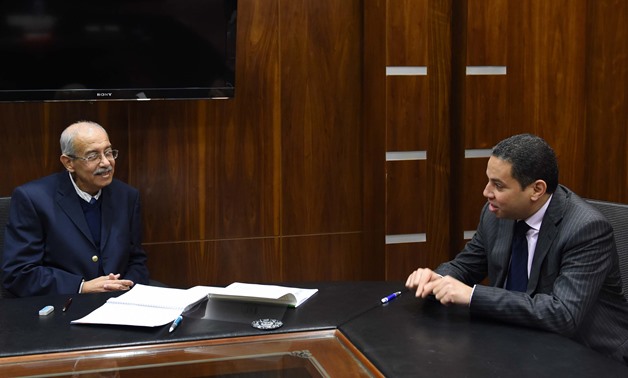
Prime Minister Sherif Ismail meets with the newly appointed Minister of Public Enterprise, Khaled Badawy, January 14, 2018 - Press Photo
CAIRO - 14 January 2017: Newly appointed Minister of Public Enterprise Khaled Mohamed Ali Badawi known as Khaled Badawy was the CEO of Al Ahly Capital Holding which is the private equity arm of the National Bank of Egypt (NBE).
The firm provides finances for the infrastructure, real estate, healthcare, sectors amongst others. It was established in 2008 with an authorized capital of LE 40 billion and issued capital of LE 5 billion.
Before assuming that position in May 2016, Badawy was the managing director of Citadel Capital S.A.E. (Qalaa Holding) which is a private equity and venture capital firm specializing in growth capital, turnarounds, leveraged buyouts, consolidations, industry roll-ups, greenfield sites, and distressed investments. The company’s activities are mainly in the Middle East and Africa.
Badawi started his banking career at the Commercial International Bank (CIB) where he served as assistant manager of the corporate banking group. Later on, he became the CFO of the Qalaa subsidiary ASEC for Manufacturing and Industrial Projects (Aresco). He also worked for the Bank of Bahrain and Kuwait, and the National Bank of Kuwait.
In September, El-Masry El-Youm reported his statements on fighting against the informal sector in Egypt. Badawi said that the issue has been one of the top challenges currently facing the economic system in Egypt.
He explained that the informal sector inhibits keeping record of the economy’s size and real growth rates and thus cripples plans of sustainable development stressing that all state financial institutions should concern their efforts on formalizing the informal sector.
Analysts suggested that Badawi was selected for the role because of his large experience in managing holding companies, securities, and dealing with stock exchanges around the world.
The ministry is in charge of eight holding companies. These are the Cotton and Textile Industries Holding Co.; the Holding Company for Metallurgical Industries; the Chemical Industries Holding Co.; the Holding Company for Pharmaceuticals; Misr Insurance Holding Company; the Holding Company for Maritime and Land Transport; the Holding Company for Tourism and Hotels (HATAC); and the Holding Company for Construction and Development.
Badawi succeeded former minister Ashraf el-Sharkawy who announced in June the eight public holding companies and their 121 subsidiary companies achieved net profits of LE 5 billion between July 2016 and April 2017 which is higher than the FY 2015/2016.
The number of companies generating profits is increasing while the number of companies suffering from losses decreased, according to El-Watan newspaper.
Modernization and expansion works have been taking place at the Aluminum Company in Nagaa Hamady city in Upper Egypt, the Iron & Steel Factory in Helwan - a southern suburb of Cairo - and the Delta Steel Mills in the Qalyubia governorate.
Sisi ordered the minister to establish a plan to develop ginning and pressing factories in Egypt in concurrence with the increase in high-quality cotton cultivation, according to El-Watan newspaper.
Egypt's House of Representatives approved their cabinet reshuffle on Sunday. In a plenary session, the Parliament voted on the reshuffle of the cabinet, which is still presided by Sherif Ismail. The reshuffle has affected four ministries: Culture, Tourism, Local Development and Public Enterprise.
The Head of Cairo Opera House Inas Abdel-Dayem was chosen as the new minister of Culture instead of Helmy el-Namnam. The Head of the Central Agency for Public Mobilization and Statistics (CAPMAS) Abu Bakr al-Gendy was appointed as the Minister of Local Development, instead of Mohamed Zein el-Abidin. Advisor to the Chief Economist of the International Monetary Fund (IMF) Rania Al-Mashat has replaced the Minister of Tourism Yahia Rashid.
The ministerial reshuffle comes in accordance with Article 174 of the constitution that stipulates that the “President shall hold the cabinet reshuffle in consultation with the Prime Minister and with the approval of the House of Representatives by an absolute majority of the attendees of the house and no less than one third of its total members.”
In the 2017 reshuffle, the new ministers included Abdel-Moneim Abdel-Wadoud as the Minister of Agriculture and Land Reclamation; Omar Arafa as the Minister of Legal and Parliamentary Affairs; Ali Meselhy, the former minister of Social Solidarity in the era of Hosni Mubarak and head of the parliamentary Economic Committee, as the Minister of Supply and Internal Trade; Mohamed Zein el-Abidin as the Minister of Local Development; Hala al-Saeed as the Minister of Planning and Administrative Reform; Khaled Abdel Ghaffar as the Minister of Higher Education and Scientific Research; Tarek Jalal as the Minister of Education; and Hesham Arafat as the Minister of Transportation and Communication. The ministries of investment and international cooperation were merged together and headed by Minister Sahar Nasr.


Comments
Leave a Comment